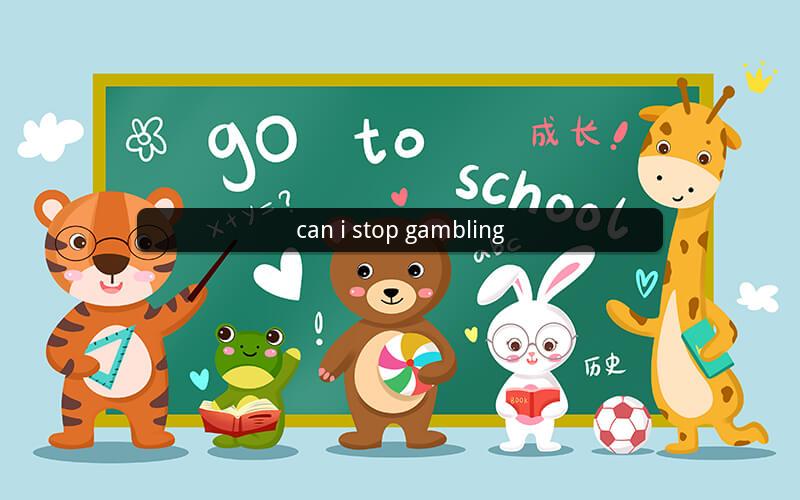
Can I Stop Gambling?
Table of Contents
1. Understanding Gambling Addiction
2. Recognizing the Signs of a Problem
3. The Impact of Gambling on Mental Health
4. Strategies for Quitting Gambling
5. Seeking Professional Help
6. Support Systems for Gamblers
7. Building a Strong Support Network
8. The Role of Therapy in Overcoming Gambling Addiction
9. Alternative Activities to Replace Gambling
10. The Importance of Self-Reflection and Change
1. Understanding Gambling Addiction
Gambling addiction, also known as problem gambling or compulsive gambling, is a serious condition characterized by an inability to control or stop gambling despite negative consequences. It is important to understand that gambling addiction is a disorder that affects both the mind and body, and it can have a profound impact on an individual's life.
2. Recognizing the Signs of a Problem
Identifying the signs of a gambling problem is crucial in determining whether or not it is time to seek help. Some common signs include:
- Feeling the need to gamble more and more to achieve the same thrill
- Lying to friends and family about gambling activities
- Using money intended for bills or other necessities to gamble
- Neglecting personal responsibilities and relationships due to gambling
- Experiencing physical symptoms such as anxiety, insomnia, or fatigue
- Engaging in illegal activities to finance gambling
3. The Impact of Gambling on Mental Health
Gambling addiction can have a significant impact on mental health, leading to conditions such as depression, anxiety, and substance abuse. It is important to address these issues in order to overcome gambling addiction and maintain a healthy mental state.
4. Strategies for Quitting Gambling
There are several strategies that can help individuals quit gambling, including:
- Setting a clear goal to stop gambling
- Developing a plan to manage triggers and cravings
- Removing access to gambling sites and credit cards
- Finding alternative activities to replace gambling
- Seeking support from friends, family, or support groups
5. Seeking Professional Help
Seeking professional help is an essential step in overcoming gambling addiction. A therapist or counselor can provide personalized support and guidance to help individuals develop the skills needed to quit gambling and maintain a healthy lifestyle.
6. Support Systems for Gamblers
Building a strong support system is crucial in the recovery process. This can include friends, family, support groups, and mental health professionals. These individuals can offer encouragement, advice, and a sense of community during the challenging journey of overcoming gambling addiction.
7. Building a Strong Support Network
Creating a strong support network involves:
- Identifying individuals who are supportive of your decision to quit gambling
- Participating in support groups or joining a recovery community
- Communicating openly with friends and family about your struggles and progress
- Establishing boundaries to protect yourself from negative influences
8. The Role of Therapy in Overcoming Gambling Addiction
Therapy can play a vital role in overcoming gambling addiction. Different types of therapy, such as cognitive-behavioral therapy (CBT) and dialectical behavior therapy (DBT), can help individuals identify and change negative thought patterns and behaviors associated with gambling addiction.
9. Alternative Activities to Replace Gambling
Finding alternative activities to replace gambling can help alleviate boredom and provide a sense of fulfillment. Some suggestions include:
- Participating in sports or other physical activities
- Engaging in creative pursuits, such as painting, writing, or cooking
- Volunteering or participating in community service
- Taking up a new hobby or learning a new skill
10. The Importance of Self-Reflection and Change
Self-reflection and change are essential components of overcoming gambling addiction. It is important to:
- Acknowledge the impact of gambling on your life and relationships
- Take responsibility for your actions and decisions
- Develop a growth mindset and be open to learning from past mistakes
- Continuously work on personal growth and self-improvement
Frequently Asked Questions
1. What is the first step in overcoming gambling addiction?
- The first step is to recognize that you have a problem and commit to seeking help.
2. Can I stop gambling on my own?
- While it is possible to quit gambling on your own, seeking professional help and support can significantly increase your chances of success.
3. How long does it take to overcome gambling addiction?
- The duration of recovery varies for each individual, but it typically takes time and commitment to overcome gambling addiction.
4. Are there any medications that can help with gambling addiction?
- While there are medications that can help manage certain symptoms associated with gambling addiction, they are not a cure and should be used under the guidance of a healthcare professional.
5. How can I rebuild trust with my family after gambling?
- Rebuilding trust involves being honest, transparent, and consistently demonstrating your commitment to change.
6. Can gambling addiction affect my career?
- Yes, gambling addiction can significantly impact your career, including job performance, attendance, and relationships with colleagues.
7. Is there a support group for gamblers?
- Yes, there are numerous support groups for gamblers, such as Gamblers Anonymous and SMART Recovery, where individuals can share experiences and offer support.
8. How can I prevent a relapse after overcoming gambling addiction?
- To prevent a relapse, it is important to maintain a strong support network, continue therapy, and be vigilant about identifying and managing triggers.
9. Can my mental health issues be related to my gambling addiction?
- Yes, mental health issues such as depression and anxiety can contribute to gambling addiction, and vice versa.
10. What resources are available for individuals struggling with gambling addiction?
- Resources include therapy, support groups, hotlines, and online forums where individuals can find information, advice, and support.